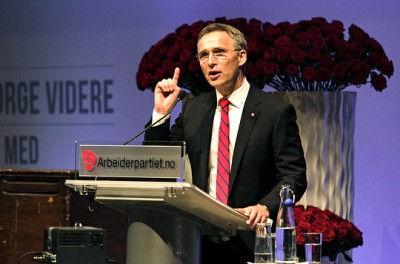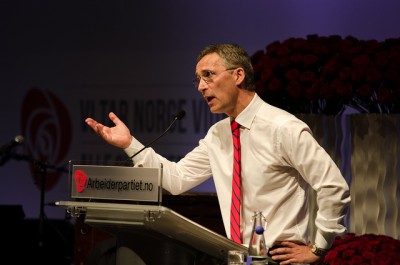Labour Party leader Jens Stoltenberg remains a popular prime minister in Norway, but his party has been lagging in the polls and his coalition government has lost hundreds of thousands of voters. That’s why he needed to spend his weekend firing up enthusiasm at the party’s national meeting, where he was also finally winning support for oil exploration off Lofoten.

Stoltenberg was off to an energetic start as Labour delegates assembled in Oslo, getting laughs out of the crowd during his opening address and enjoying sustained applause. Building up their own spirits for a tough election campaign ahead is critical, if his government is to have any chance of re-election to a third term in September.
He teased those who have claimed his politics are “unexciting” and that his government’s state budget is “boring,” retorting that the governments of Greece, Italy and Portugal may present far more “exciting” budgets but not the type he wants for Norway. Stoltenberg claimed his goal is to govern the country in as “unexciting” a manner as possible, so that Norwegians “can live exciting lives.”
Norway’s budget surpluses at a time when most countries in the world are drowning in deficits is thanks largely to the country’s oil industry, but Stoltenberg could claim that it also has something to do with steady and “unexciting” management of the country’s resources. His government has been careful not to use too much of the oil revenues (which may contribute to some of its unpopularity) and to maintain economic growth, also in the non-oil sectors of the economy.

It was Norway’s offshore oil itself that immediately fueled the party’s biggest internal argument: Whether to move forward with an official study of the consequences of oil drilling off Lofoten and Vesterålen, some of the most scenic portions of Norway’s coast and in seas that are the richest in fish. Called a konsekvensutredning in Norwegian, it’s highly controversial because such studies normally usher in exactly what they’re studying. Those firmly opposed to any prospective oil and gas production off Lofoten and Vesterålen don’t see any need for such further study or preparation for it.
The oil industry has been pushing hard to be able to explore and drill for oil, as have the labour unions that support the Labour Party, and thus need the study to move forward. The Lofoten issue has reportedly even split Stoltenberg and his main soul mate (and likely successor) within the party, Jonas Gahr Støre. It’s “Jens vs Jonas,” reported newspaper Dagsavisen in an article on the national meeting earlier this week. Fully 13 of 19 county chapters of the party also oppose the study that could lead to drilling off Lofoten, indicating strong grassroots challenges for the party leadership. Stoltenberg also faces opposition from Labour’s youth organization AUF.

On Friday it was looking, though, like Stoltenberg and his party leadership would win on the Lofoten issue, a result sure to disturb his government partners, the Socialist Left party (SV) and the Center Party, both of which have opposed drilling off Lofoten at their earlier national meetings. Not only might AUF and its leader Eskil Pedersen fail to prevail in their arguments, Norwegian Broadcasting (NRK) reported that Trond Giske, another influential Labour official who serves as Norway’s business and trade minister, was going against the wishes of his own county chapter in Sør-Trøndelag and voicing support for Stoltenberg’s position.
“I think we’re well-served with broad agreement on gradual and careful development of the oil and gas sector in Norway, where concern for the environment and safety will always play an important role,” Giske told NRK. “I don’t want permanent preservation of these waters.”
That marked the first time Giske has actually taken a stand on the sensitive Lofoten issue, and he was siding with the party leadership. “But we’re working on a compromise now,” Giske told NRK. The compromise, also reported by newspaper Aftenposten on Friday, was meant to lead to as few Labour politicians as possible voting “no” to the study.
Preserving Norway’s single largest source of income to fuel the welfare state thus seemed most important to Labour’s leaders. Labour’s motto this year is “Vi tar Norge videre” (“We’re taking Norway farther.”) Stoltenberg and his party leaders want to keep their jobs running the government and further their own policies to preserve the welfare state. Job creation remains a top priority, along with maintaining Norway’s low unemployment. Now Stoltenberg, struggling to regain the solid support he had after the terrorist attacks of 2011, needs to keep the grassroots with him as well as get more voters on his side.
Views and News from Norway/Nina Berglund
Please support our news service. Readers in Norway can use our donor account. Our international readers can click on our “Donate” button:

